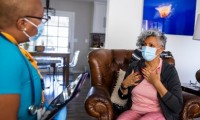-
Usability challenges for at-home devices top ECRI’s 2024 hazards list
- Source: drugdu
- 353
- February 4, 2024
-
Edwards receives FDA approval for first transcatheter tricuspid valve replacement treatment
- Source: drugdu
- 348
- February 4, 2024
-
Roche’s Vabysmo Shows Sustained Improvements in Vision, Retinal Drying in Retinal Vein Occlusion
- Source: drugdu
- 310
- February 4, 2024
-
Veracity Benefits, Levrx Technology Reveal New Digital Health Tech App
- Source: drugdu
- 344
- February 4, 2024
-
Johnson & Johnson Seeks Approval for Darzalex Faspro Combo in Newly Diagnosed Multiple Myeloma
- Source: drugdu
- 440
- February 2, 2024
-
Abbott Announces New High Protein Weight Loss Shake
- Source: drugdu
- 476
- February 2, 2024
-
World’s First ‘Blood Matching’ Genetic Test to Better Pair People for Blood Transfusions
- Source: drugdu
- 548
- February 2, 2024
-
Innovative ‘Fragmentomics’ Approach to Enable Earlier Detection of Cancer Using Smaller Blood Draws
- Source: drugdu
- 372
- February 2, 2024
-
Biogen abandons Aduhelm efforts, focuses on Eisai-partnered Leqembi and pipeline drugs
- Source: drugdu
- 503
- February 2, 2024
-
Daiichi Sankyo again dials up Enhertu sales forecast, advances 2nd AstraZeneca-partnered ADC
- Source: drugdu
- 464
- February 2, 2024
your submission has already been received.
OK
Subscribe
Please enter a valid Email address!
Submit
The most relevant industry news & insight will be sent to you every two weeks.













